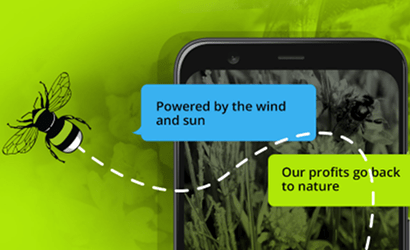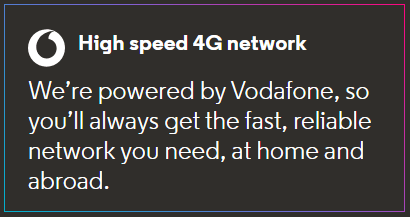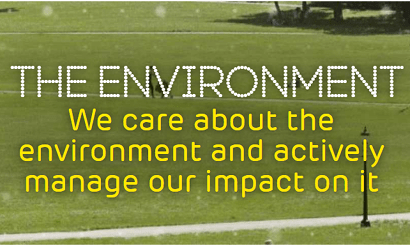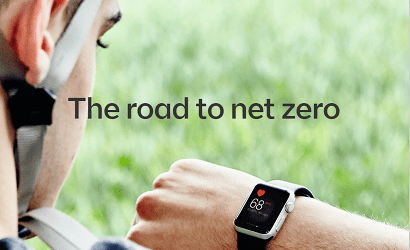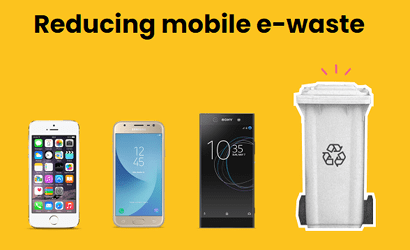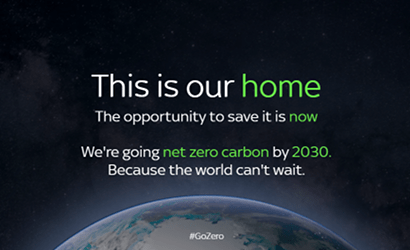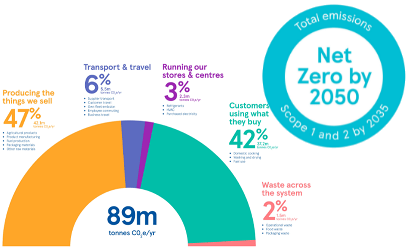Best networks for carbon emissions and environmental issues

The retailers featured on this page may compensate us when our readers follow links to their websites and make a purchase. More
We look at which UK providers are best to join if you want to reduce the environmental impact of using your mobile phone. Last updated: 4th April 2022.
How the networks compare
Joint 1st: Honest Mobile are the first carbon negative network

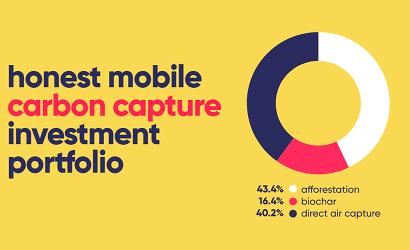
✔ Honest help reduce carbon levels in the atmosphereHow they do it
at honestmobile.co.uk
(opens in new window)
Honest Mobile the only carbon negative UK network. This is done through a method called DAC (Direct Air Capture) where machines take carbon dioxide out of the air and turn it into stone where it no longer impacts the atmosphere.
They’ve also made big investments into Biochar, which is where organic waste that would usually produce CO2 is broken into a sort of charcoal that traps that CO2. This makes up only a small part of their offsetting for now.
Honest Mobile are also the only BCorp mobile network. This means they are certified as a company working towards positive environmental change.
And finally, when you take one of Honest’s SIM only deals, some of the money you pay goes into planting more trees. This is a slow, long term contribution rather than an immediate one.
Honest have also claimed to reduce plastics in their SIM cards and have committed to making their products recyclable. If you want to join a network that emphasise reducing carbon emissions then Honest are a good choice.
Useful link: See Honest Mobile’s environmental pledges
Joint 1st: Ecotalk are a sustainable network and focus on biodiversity
Another network who market themselves as environmentally friendly are Ecotalk, but they go about it in a different way. Their whole network is powered by wind and sun and they’ve dedicated themselves to rebuilding Britain’s ecology.
They currently have a few case studies of areas that they’ve turned into havens for all sorts of species. It’s a different approach to protecting the environment by promoting biodiversity instead of focusing solely on carbon emissions.
But Ecotalk also power their entire operation with clean, renewable energy. They do use the EE network, but we think they pay them to use sustainable energy sources to make sure their power is being sourced properly.
It’s odd that they haven’t mentioned anything about using recyclable SIMs or how they plan to reduce plastic waste. But, if biodiversity is important to you, Ecotalk are worth looking at.
Useful link: See Ecotalk’s SIM only plans
2nd: Vodafone do a decent amount to reduce their environmental impact

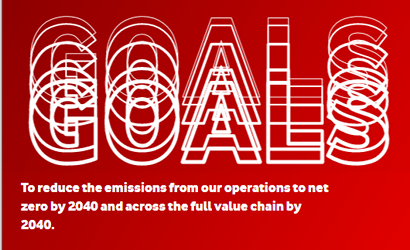
✔ They’ve put effort into reducing their carbon footprintRead their pledge
at vodafone.co.uk
(opens in new window)
It’s inevitable that running a large mobile network will have negative effects on the environment, yet all of them take actions to reduce this. Vodafone do more than the other main UK networks in reducing the amount of damage they cause.
They’re aiming to become “net zero” by 2030 in Scope 1 and 2 activities. This means they’ll stop emitting carbon through their activities and their purchase of electricity by that date. Their entire chain should be net zero by 2040.
Those are some long term goals that don’t make much of an impact for now. But Vodafone have made it so their own offices are powered by 100% renewable energy, and 56% of the energy they use comes from renewable sources.
Finally, they’ve committed to reducing plastic in the environment by introducing recyclable “Eco-SIMs”, introducing eSIMs and pledging that all plastic waste they create will be reused or recycled by 2025.
Useful link: Vodafone’s environmental pledges
Joint 2nd: VOXI benefit from Vodafone’s environmental changes
If you look on VOXI’s website you won’t see a lot mentioned about the environment. However, this is because VOXI are a part of Vodafone, and so share the same environmental pledges as their parent company.
This means that VOXI should become a net zero carbon emitter by 2040 according to Vodafone’s goals. And since VOXI are mostly online, they don’t produce as much waste and the energy used to power them is 100% renewable.
But what do they do different? Well, VOXI point to their efforts towards refurbishing and reselling old phones. The move’s arguably more about having a cheaper product to sell to their types of customer but it still means fewer phones being wasted.
They also make donations to the Cool Earth charity. And VOXI have pledged to introduce the same Eco-SIMs as Vodafone in 2022. If you don’t mind joining a smaller network and like these pledges then you should join them.
Useful link: Vodafone’s guide to their Eco-SIMs
3rd: EE are also decent at reducing their impact
The next best main network for reducing environmental damage caused by their operations are EE. They have similar goals to Vodafone in that they plan to become a “net zero” emitter by 2030.
And their network is entirely powered by 100% renewable energy. However, they still produce carbon emissions in their supply chain. EE stores and delivery vans still produce carbon, which EE are seeking to reduce.
They’ve also introduced eSIMs, which helps reduce the amount of plastic waste from SIM cards. They also claim that no waste has been sent to the landfill from their offices, and all plastics they produce will be recyclable or removed by 2025.
Finally, EE have made no claims to reduce Scope 3 emissions like Vodafone have, and they haven’t done quite as much to reduce plastic waste from their operations as Vodafone. It’s a close call, but they fall just a little short here.
Useful link: EE’s environmental pledges
4th: BT Mobile have big ambitions but are a work in progress
It’s difficult to say how much BT Mobile have reduced their impact on the environment, because the only information available comes from the BT brand as a whole. But they have done a lot to reduce their carbon emissions.
BT claim to have reduced carbon emissions by 29% over the past year and claim the BT brand will be completely net zero by 2030. They’re also aiming at reducing supply chain emissions by 42% by 2031 and making it net zero by 2045.
Their mobile network is also powered by 100% renewable energy. BT’s biggest current source of emissions are their fleet of 33,000 delivery vans which they claim the majority of which will be moved to electric models by 2030.
Finally, BT claim that by 2025 they will no longer send plastics to landfill. There are a lot of big ideas here to reduce BT’s overall impact. But if you want a network that’s already put changes in place, then look elsewhere.
Useful link: Read BT’s environmental report
5th: Co-op Mobile do a lot to offset their negative environmental impact

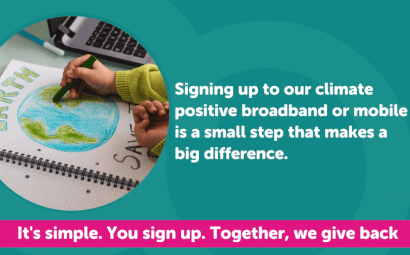
✔ Reducing carbon emissions is a big part of their marketingRead more
at broadband.yourcoop.coop
(opens in new window)
Despite being a smaller network provider, Co-op Mobile do their part to reduce the negative environmental impact of running their network. And they offer a few ways to help customers to reduce their impact too.
The main way Co-op Mobile help offset their impact is by reducing carbon emissions for every customer. They claim to reduce each customers’ carbon output by 25kg a month, and they also plant trees on your behalf.
They’ve also partnered with Ecologi to help fund reforestation and sustainable energy projects around the globe. Part of your monthly bill goes towards helping fund these projects.
However, Co-op haven’t set a target for becoming carbon neutral. While it’s good that they offset part of their impact, their claims of being an ethical network would hold more water if they were entirely carbon neutral.
Co-op also don’t offer eco-SIMs nor have they seemingly done much to reduce plastic waste. Considering they’re a smaller network they do a fair amount to reduce their negative environmental impact, but they just fall a bit short overall.
Useful link: Co-op's partnership with Ecologi
6th: O2 don’t reduce plastic waste as much as other networks

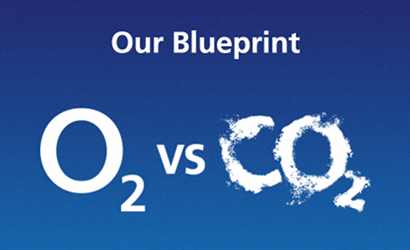
✔ They aiming to be the first major net zero networkHow they'll do it
at o2.co.uk
(opens in new window)
O2 are the third major network on this list, and they fall a bit further behind Vodafone and EE. This is mostly because of their lack of action taken to reduce plastic waste. Otherwise their pledges are decent.
Firstly, they’ve set their net zero emissions target at 2025, five years before Vodafone and EE. Since 2015 they’ve reduced carbon emissions by 29%, increased energy efficiency by 82% and are powered by 100% renewable energy.
You can also get money back when sending in an old device for O2 to recycle or refurbish. The scheme’s called O2 Recycle and it helped stop 3.3 million devices going to landfill. They’ll even take damaged phones.
While that’s a good start, O2 do very little to reduce the amount of plastic waste they create. They have introduced eSIMs, but if plastic pollution is a big issue to you then you might want to look at the networks above instead.
Useful link: See O2’s environmental pledges
7th: giffgaff do quite a bit to reduce their impact
The main environmental benefit of being on giffgaff is that you’re getting onto the O2 network, which is powered by 100% renewable energy and should be net zero by 2025. But giffgaff also have their own schemes in place:
Firstly, giffgaff encourage and help their customers to recycle their old devices. They claim that half of their phone sales in 2020 were made up by refurbished phones, and they’ll sell more refurbished phones than new ones in 2022.
For a small provider that’s quite a big change. Still, it’s probably the case that giffgaff are pushing these refurbished phones as it helps them turn a profit, rather than being a wholly environmental decision.
Finally, their SIMs are now 95% recyclable and have massively reduced ink waste. Still, they don’t say how much they’ve reduced office waste. Depending on your environmental priorities, they might be a decent choice for you.
Useful link: See giffgaff’s range of refurbished phones
Joint 8th: Three don’t do as much as other networks to offset their impact


✔ The other main networks do more to offset their impactSee their page
at three.co.uk
(opens in new window)
Three currently do less than the other three to offset their massive impact on the environment. But they have a few environmental pledges in place.
Firstly they don’t have a set goal for becoming a net zero or even a carbon neutral network. They are reducing their carbon emissions, but we can’t say by how much or when they plan to become net zero.
Without a goal we can only say that Three aren’t publicly as committed to reducing their carbon emissions as other networks. They are powered by 95% renewable energy, but that’s also behind the other main networks.
Other than that they did recycle 98% of office waste in 2021 and have pledged to produce less plastic (and they offer eSIMs).
Joining a main network inevitably means you’re joining a network that has more of a negative environmental impact But if you want to join a main network that helps offset this impact, we’d say look somewhere else.
Useful link: See how you can recycle your old device with Three
Joint 8th: SMARTY share the same pledges as Three
SMARTY are a part of the same company as Three, so anything Three do to improve the environmental impact of running their physical mobile network benefits SMARTY too.
Since SMARTY run out of a small office and don’t have stores, you’re having less of an impact joining them than you would if you joined Three, for example. But they also don’t do as much to offset their impact as the networks above.
They are mostly online so they don’t produce much office or in-store waste. But they also don’t offer any ways of reducing plastics in SIM cards or reducing carbon emitted when making deliveries.
Overall, if you’re concerned about the environmental impact of your network then there are much better options available.
Useful link: Read our full review of SMARTY
9th: Virgin Mobile should soon be a net zero emitter

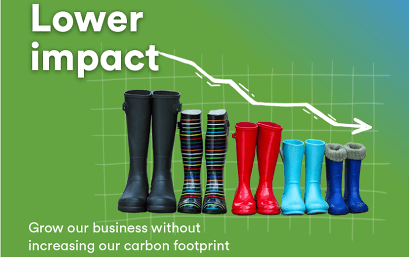
✔ Virgin Media have a broadband network tooSee Virgin’s pledge
at virginmedia.com
(opens in new window)
Like BT Mobile, it’s hard to say how much is being done to make Virgin Mobile itself a more sustainable network as most of the goals being set are being done across the entire Virgin Media brand.
They do claim that they will be a net zero emitter by 2025 and that by the same year they will send no plastic waste to landfill sites (only 3% of office waste went to landfill in 2019).
But they’re not powered by renewable energy. While Virgin Media have taken steps to become more energy efficient, they haven’t taken the next step in becoming renewable.
In the end, the Virgin Media brand is massive and has a huge effect on the environment and Virgin Mobile don’t do as much as other networks to reduce their impact. So we can’t give them a good ranking here.
Useful link: Read Virgin Media’s environmental pledge here
10th: Sky Mobile are powered by completely renewable energy
Sky Mobile are another network that are part of a massive brand. And they simply don’t do quite as much as some other networks in reducing their environmental impact, especially as a specific part of the brand.
It is notable that Sky as a brand are already carbon neutral. This means they offset the carbon they let into the atmosphere entirely. But they claim they will be net zero by 2030.
The entire brand is also powered by 100% renewable energy. And Sky work with WWF and other charities to reduce deforestation, levels of plastic production and so on. There are very little specifics on this though.
The Sky brand has taken some good first steps, but it’s not quite enough. If Sky Mobile did more to offset its impact then it would improve our view of them. They will recycle your devices, but that’s about it.
Useful link: See all the ways Sky are reducing their impact here
11th: Tesco Mobile don’t do much to reduce their impact
Tesco Mobile are part of the Tesco brand, so you might want to consider the impact of the entire brand before joining them. But, there isn’t a lot of information about what Tesco Mobile are doing to reduce their own impact.
The Tesco brand has seen a 54% reduction in greenhouse gas emissions over their Scope 1 and 2 products (including mobile) and are set to become net zero by 2035.
In terms of waste reduction, Tesco have lowered their production of plastic waste across the whole brand. And you can go into a Tesco store to get your phone repaired in their mobile section, which is another step to reducing waste.
Finally, Tesco are also committed towards net zero deforestation and currently 100% of their paper is sustainably sourced. In the end, there are a few things done to reduce Tesco Mobile’s impact, but nothing specific as of yet.
Useful link: Recycle your old device with Tesco Mobile
Joint last: every other mobile network






✔ No specific environmental pledges for these networks
These are the networks that either don’t have any specific schemes in place to reduce their environmental impact, or simply don’t do nearly enough to make a difference.
Both Plusnet and iD Mobile have trade in schemes where they’ll recycle your phone for you. iD Mobile (via Curry’s) will even pay you for handing in your phone. But otherwise they have nothing specific in place to reduce their impact.
These providers might benefit slightly from the environmental changes that their host networks have put in place. But this isn’t significant enough to say they’re offsetting the impact of their own operations.
There is a consolation here, however. It’s arguable that these networks don’t have as much of an impact in the first place. And they’re generally cheaper, meaning you can free up some money to donate to environmental causes directly.
But that’s all theoretical. If the environmental impact of your mobile network is something you think a lot about then we think you’re best steering clear of these networks.
Useful link: Compare SIM only deals using our comparison tool

